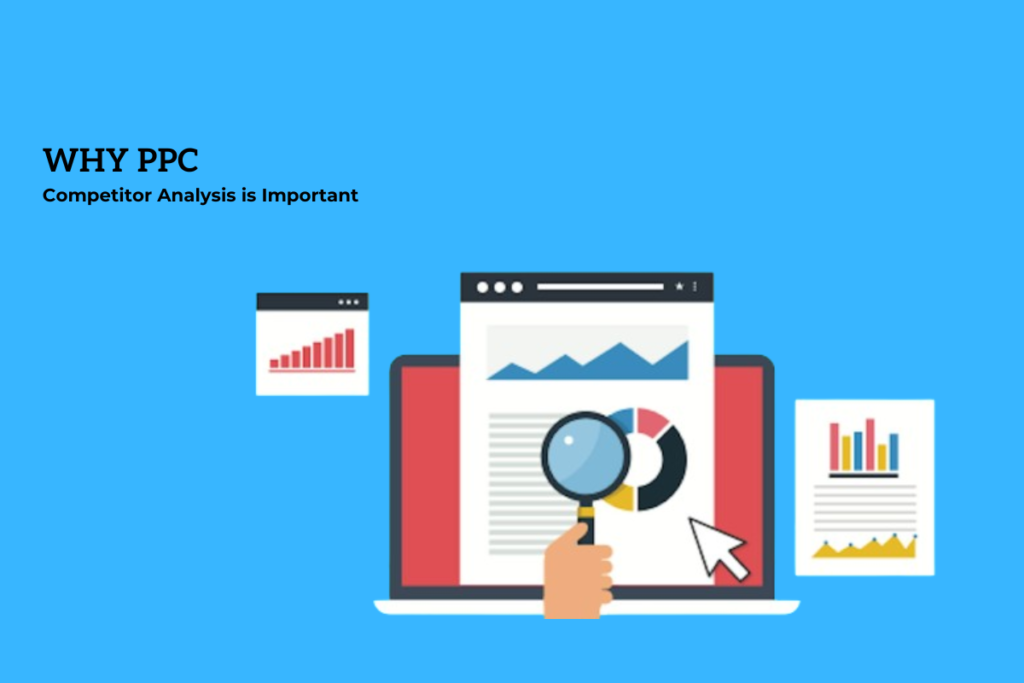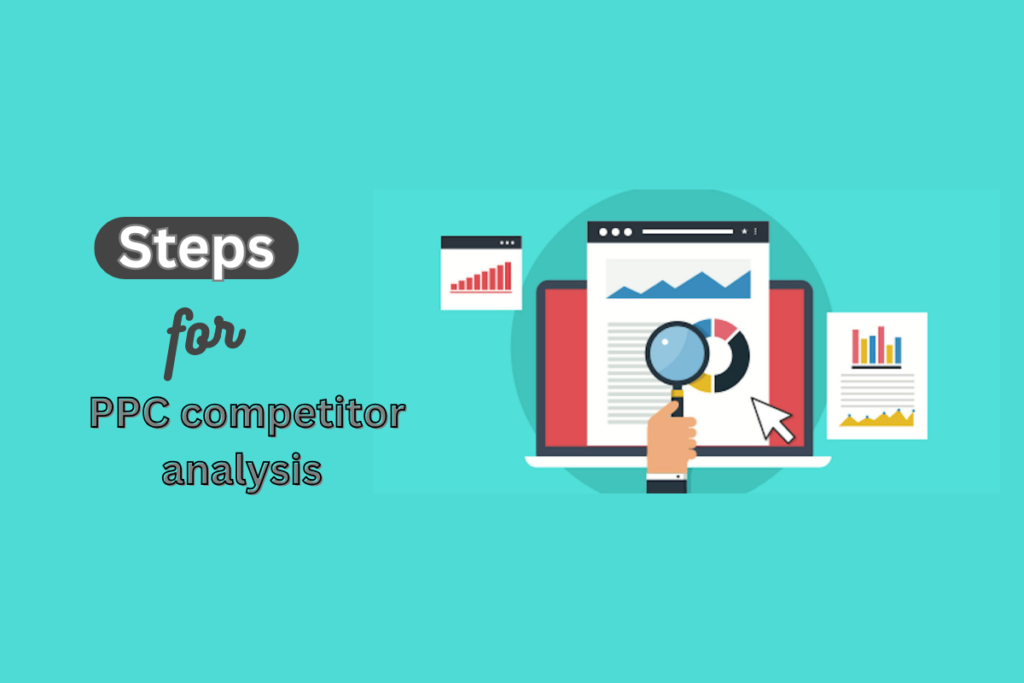How to do ppc competitor analysis
PPC (Pay-per-click) is the name of the game for improving website visibility and increasing sales. However, one has to execute a well-implemented campaign to drive fruitful results. While the existence of so many competitors can make it hard to stay on top.
A PPC competitor analysis is compulsory to beat the market competition. While selling any product\service you have to measure your competitor’s strategy. It keeps you posted on current market trends and develops a winning strategy.
What is PPC Competitor Analysis
PPC Competitor Analysis is a systematic process of spying on your market competitors. In simple words, it is a practice of evaluating competitors’ performance and strategies to improve your marketing efforts and accomplish long-term goals.
Why PPC Competitor Analysis is Important

When developing a solid pay-per-click campaign you would want to check what your competitors are doing. It will help you to learn from their failures and avoid numerous mistakes during your campaign. Marketing experts can check the current position of their competitors in the middle fo their ad campaigns.
| Aspect | Importance |
| Identifying Competitors | Essential for understanding the landscape of the market and knowing who you are up against. |
| Understanding Strategies | Helps in comprehending the tactics your competitors are using to attract customers. |
| Benchmarking Performance | Enables comparison of your performance with competitors, identifying strengths and weaknesses. |
| Keyword Research | Allows you to discover keywords that competitors are targeting, providing insights for your own campaigns. |
| Ad Copy Analysis | Offers insights into the messaging and positioning your competitors are using, aiding in crafting more effective ad copies. |
| Budget Allocation | Helps in optimizing budget allocation by understanding how much competitors are investing in PPC campaigns. |
| Identifying Opportunities | Identifies gaps in the market or areas where competitors are underperforming, providing opportunities for you to capitalize on. |
| Enhancing Strategy | Assists in refining your PPC strategy by learning from competitors’ successes and failures. |
| Staying Competitive | Keeps you updated on market trends and ensures you remain competitive in the constantly evolving landscape. |
| Improving ROI | Facilitates making informed decisions to enhance return on investment by learning from competitors’ strategies. |
Steps to do PPC competitor analysis
Doing PPC Competitor analysis offers numerous advantages as mentioned above. However, doing it the right way is the key, a slight mistake can ruin your hard work. Therefore, it is essential to adopt best practices when doing competitor analysis.

Below is a step-by-step process
Step 1
Identify Competitors: Begin by compiling a list of your main competitors in the PPC arena. Utilize search engines, industry directories, or even social media to identify businesses targeting similar keywords and audiences as you.
Step 2
Keyword Analysis: Once you have your list of competitors, delve into their PPC keyword strategies. Tools like SEMrush or SpyFu can provide valuable insights into the keywords they’re bidding on. Look for high-performing keywords that you may not be targeting yet, and assess the competitiveness of each keyword in your niche.
Step 3
Ad Copy Analysis: Next, scrutinize the ad copy your competitors are using. Visit their ads on search engine results pages (SERPs) and take note of their messaging, offers, and calls to action. Identify any patterns or unique selling points they’re highlighting in their ads.
Step 4
Landing Page Analysis: Visit the landing pages your competitors are directing their PPC traffic to. Evaluate the design, layout, and content of these pages. Pay attention to elements such as headlines, imagery, and forms, and assess how well they align with the corresponding ads.
Step 5
Ad Extensions: Take note of any ad extensions your competitors are leveraging. These extensions can include site links, callouts, or structured snippets. Evaluate how they’re enhancing the visibility and relevance of their ads to attract more clicks.
Step 6
Bid Strategy: Estimate your competitors’ bid strategies based on their ad placement and frequency. Tools like Google Ads Auction Insights can provide some insights into this aspect. Look for trends in bid adjustments or bidding patterns across different keywords.
Step 7
Budget Allocation: Determine how much your competitors are investing in PPC advertising. While you may not have access to exact figures, you can gauge their investment based on ad frequency and keyword competitiveness. Consider whether they’re allocating their budget evenly across campaigns or prioritizing certain keywords.
Step 8
Geographical Targeting: Analyze the geographical locations your competitors are targeting with their PPC campaigns. This can provide valuable insights into their target markets and audience preferences. Consider whether there are opportunities for you to expand into new regions or refine your targeting based on their strategies.
Step 9
Ad Performance Metrics: Evaluate key performance metrics such as click-through rate (CTR), conversion rate, and ad position for your competitors’ ads. Identify which ads are performing the best and try to understand the factors contributing to their success.
Step 10
SWOT Analysis: Finally, conduct a SWOT (Strengths, Weaknesses, Opportunities, Threats) analysis based on your findings. Assess your competitors’ strengths and weaknesses in terms of their PPC strategies, and identify opportunities and threats in the competitive landscape. Use this analysis to inform your own PPC strategy and stay ahead of the competition.
Conclusion
Conducting a PPC competitor analysis is crucial for staying ahead in the competitive landscape of online advertising. By systematically analyzing your competitors’ strategies, keywords, ad copies, landing pages, and performance metrics, you can gain valuable insights to enhance your own PPC campaigns.
FAQs:
It’s recommended to conduct a PPC competitor analysis regularly, ideally every few months or whenever there are significant changes in the market or your competitors’ strategies.
Yes, there are several free tools available for conducting basic PPC competitor analysis, such as Google Ads Auction Insights, Google Keyword Planner, and Google Trends.
Direct competitors are businesses offering similar products or services, targeting the same audience as you. Indirect competitors, on the other hand, may offer different products,
If you find that your competitors are consistently outperforming you in PPC campaigns, it’s essential to analyze their strategies in-depth to identify areas for improvement. Focus on refining your keyword targeting, ad copy messaging, landing page experience, and budget allocation based on your findings.




